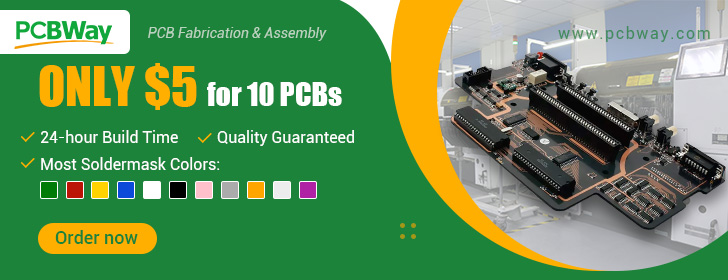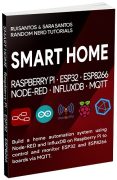I put together a list of 9 essential tools that I think all electronics lab must have. Either if you are just start building your own lab or want to improve yours, here’s the must have tools.
1. Soldering Station
For electronics projects that require a lot of rework and construction, you will need to use soldering tools frequently. However, even in simple projects, a soldering station is essential as lot of components don’t come with their pins attached so, you’ll eventually need to use the soldering iron. If you need some advice on getting the proper soldering iron, read: Best Soldering Irons for Beginners and Hobbyists.
2. Hot Glue Gun
A hot glue gun is not truly essential in an electronics lab, however I absolutely recommend you to have one, because that are very handy to fix things.
3. Dremel Rotary Tool
If you like to build your own robots, PCBs or whatever, a rotary tool is really useful so that your final project has a more professional look.
4. Multimeter
A multimeter is a measurement tool that is absolutely necessary. If you’re looking to buy one, I truly recommend you an auto-range multimeter. The auto-ranging is a great advantage, because it saves you of the hassle of having to know which range of value the electrical characteristic you’re measuring falls under.
5. Precision Screwdriver Set
This is a tool that at some point in your projects, you’ll need. I recommend one with a set of extension bits because you’ll need all of them sooner or later.
6. Tweezers
Tweezers are very useful to manipulate the small electronics components. The ones in the picture below have an extremely small and pointed tip, which is perfect for electronics.
7. Cabinet Organizer
This is not exactly a tool, but I thought it was so useful that I’ve included in this list. A cabinet organizer is essential so that you have all your components organized. There are a lot of cabinet organizers for electronics components with drawers that you can label, so that you always know where everything is.
I have two cabinets as the one in the picture below, and I absolutely love them. No more struggles trying to find components.
8. Third hand tool
Many task are much easier with the help of a third hand tool, such as soldering, wiring among others. There are lot of hand tools with many different characteristics, fell free to choose the one that best fits you.
9. Self-adjusting wire stripper/cutter
A wire stripper is essential in an electronics lab. I have a self-adjusting wire stripper/cutter. All automatic wire strippers should be this easy to use!
With this wire stripper all you have to do is set the strip length, insert a wire, squeeze the handles, and you’re finished.
I wrote a post few months ago about my self-adjusting wire stripper/cutter, that you can check here.
Wrapping Up
Do you have all these tools in your Electronics Lab?
Are you thinking about ordering one of theses tools listed above?
Leave a comment down below!
Share this post with a friend that also likes electronics.
Thanks for reading,
-Rui
P.S. Here’s a another blog post that you can read that it is dedicated to Arduino modules: “21 Arduino Modules You Can Buy For Less Than $2“.

















Good list. You could add:
1)a spring loaded solder sucker to unsolder joints and probably solder remov ing wire mesh tape.
2)needle nose pliers and angled wire cutter.
3)I have used a simpler cheaper wire stripper for years. Yours is certainly a good choice if one works with very different wire diameters
Thanks for the feedback!
1) and 2) Agree, those are also must have tools
3) Exactly, a regular wire stripper is perfect if you aren’t constantly using different wires
Yes very good list … it seems I have 8 out of 9 … those precision tweezers look interesting.
I would also recommend either a variable power supply or a multiple port USB mains adaptor.
Plus a good bright light source such as an angle-poise lamp.
Thanks for the great suggestions!
Thank you Richard for your feedback. Lighting is very important.
I’m always using the tweezers when soldering components to PCBs
Very good. I guess solderless breadboard , jumpers , power supply should also need.
They are definitely also must have components! Thanks for your suggestions
I prefer Solder Wick braid for de-soldering over the solder sucker. You get less damage to your board and a better removal of solder from existing through holes. Use some cheap 91% isopropyl (rubbing) alcohol to clean left over flux on the board. You can buy this at any drug store/grocer.
I do a lot of surface mount prototyping for analog development, so a better form of magnification is very useful. If you can justify the expense, a cheap (<$500) stereo microscope out of China is necessity in my work. Not everyone needs this, but with the new LED ring lights these are very useful and we are rapidly approaching the time when only surface mount parts are available on new IC's.
If you can find a cheap small drill press vice, I find it more useful than the third hand; much more stable and versatile.
I very much agree with everything on your list and thanks for publishing.
Hi Wayne,
I’ve bought various solder suckers and they always get jammed. So I also prefer solder wick.
Thank you for your insight!
Have a great day,
Rui
Good list of equipment for a beginner.
I would also recommend a DC variable voltage / current power supply (~$80) and a MK-328 Transistor Tester Capacitor ESR Inductance Resistor Meter (~$35) to the list.
The power supply is in my opinion essential, the component tester is a luxury but well worth having.
Yes, I agree the bench power supply should be on this list.
Thanks for the suggestions!
Rui
Rui,
Excellent suggestions!
I used a “third hand” tool for years until I bought an inexpensive PCB vise. The Aven 17010 costs less than US$13 from Mouser.com.
Thank you Karl for reading the article.
That’s a great model, I’ll probably get the Aven 17010 myself!
A cordless Dremel is considerable easier to use than a corded one! No cable to get in the way.
I agree!
Thanks for the tip on the self-adjusting wire stripper. I wasn’t aware of these and I can see where they will be a time saver for me (the simple stripper was not as foolproof as this appears to be). Will definitely get one.
It’s definitely a time saver!
Hello Rui,
One tool that is a must-have for me is a hand magnifier with a led light built-in, especially useful for check the soldering points, read the labels on the IC, transistors, etc.
Probably is useful for me because my eyes are tired, I know that the third hand have one magnifier, but for me, is easy to move the magnifiers where I need it, instead of moving the part.
I really enjoy your blog, I wold to see more esp266 projects with the arduino IDE, because for me, learn another language like LUA is a time learning curve.
I modify the “2 relay control” to have just one relay, and two buttons, one button is a RESET, and the other button is a toggle button, with that button, I can turn on/off the relay directly in the module, instead of looking for a computer or phone, can you modify your sketch to have only one button on the page, that works as a toggle button that change of color and level, depends of the state of the relay ?
in my sketch, one button is connected to the RESET pin, the other button is connected to the GPIO1, and the relay is connected to GPIO2.
Thank you for your blog, and for sharing all your knowledge and experiences.
Daniel
Hi Daniel,
I agree with you. Lighting is also very important.
I’ll be trying to post more projects using the Arduino IDE, but I probably won’t write that exact sketch.
I’m working on a new project as we speak. I recommend that you open your Arduino IDE and if you have the ESP8266 installed.
Open your Arduino IDE > File > Example. And take a look at ESP8266 code examples. There’s good information there.
Thanks for reading,
Rui
Nice list, man!
Thank you João!
I also have a tiny Oscilloscope (XMega XProtolab) which sits in my breadboard ready to be patched in. For the negligible cost it’s very worthwhile. The USB one that links to a PC/Mac/Android is only $20 so a very low cost option.
Oh, nice list!
I store my electronics in plastic boxes for kits. Cabinet Organizer sound a better solution; I’ll get one of this.
I was thinking about OSCILLOSCOPE?
Okay, actually not that important for a beginner… then there’s breadboard and jumper wires for a beginner (and also pro).
Thanks for this post.
You’re welcome Sam!
The plastic boxes are also very useful and handy to have laying around!
Good job. I use several power suply for my projects. Meybe added to list digital Oscilloscope??
Hi Rui,
#9 is new to me! I’ll try it out because it looks very usefull – excellent proposal!
Regards,
Michael
Meanwhile I received the wire stripper #9 – it’s a really excellent tool!
Thanks for the hint, Rui!
Regards, Michael
Hello Rui,
Nice list.
You could add a logic probe (very userfull) and a logic analyzer.
Kregards,
AH
Yup, that’s definetly a must have tool!
I use an old microscope when I need to solder. When you get older, your eyes don’t work as well in close. I bought a great LED ring light for it for less than $30.
where do i order a cheap cabinet organizer?
That can be a bit tricky, since the cabinet organizers are fairly large and heavy they usually are more expensive when buying online.
I’ve actually bought the cabinet organizers from the eBay link above, but you might be able to find a good alternative in a local store.
Very useful tools you mention. Some of them are uncommon. thanks for the post
You’re welcome.
Thanks for your support.
Hi, Thank you for your blog, and for sharing all your knowledge and experiences.
Hi.
Thanks for your support.
Regards 🙂
These 9 tools are really amazing and can do all your works with ease and reduce you effort.
Indeed!
We love these tools.
Thanks for sharing your opinion.
Yep, I have all these tools – especially #9 is very, very usefull – absolutely all are indispensable!
Thanks and regards, Michael
Hi there, Great tips by the way and thank you. I hope very electronic lab must have this product. I like your all product. Any lab owner looks the all-electronic product I suggest follow this article. I did have a question though. I’m hoping you can answer it for me since you seem to be pretty knowledgeable about the electronic product. all electronic product have any product USP post.
Thanks for reading!
Thanks